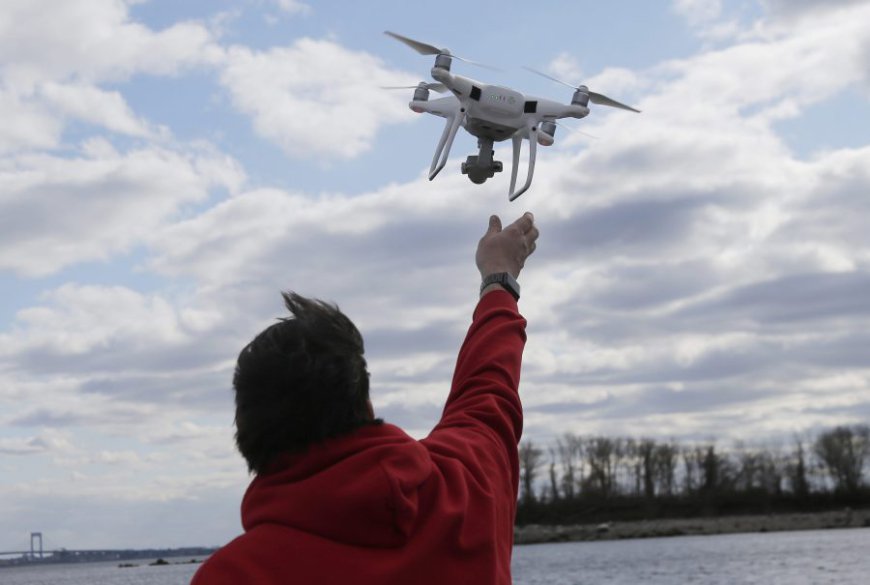Is it legal to shoot down a drone in Missouri or Illinois?
Drones are becoming an increasingly common sight around the United States, including here in the St. Louis region.

ST. LOUIS - Drones are becoming an increasingly common sight around the United States, including here in the St. Louis region.
For some, drones are seen as fascinating and innovative tools. For others, they may raise concerns about privacy and safety.
In New Jersey, a surge in mysterious drone activity has recently captured widespread attention. While these drones haven't posed any immediate threats to public safety, they've sparked enough unease for at least one state official to controversially suggest shooting them down.
The situation in New Jersey has fueled a broader question: Is it even legal to shoot down a drone?
For Missouri and Illinois, the two states of the St. Louis metropolitan area, here are some considerations to keep in mind.
Federal law
First and foremost, the FAA considers recreational unmanned aircraft systems like drones to fall within regulatory definitions of an aircraft.
According to the Aircraft Sabotage Act, damaging or destroying an aircraft is a federal offense, which would seemingly entail the act of shooting down a drone.
Missouri
Missouri Statute 571.030 outlines specific provisions for which discharging a firearm constitutes unlawful use of a weapon. Such scenarios include, but aren't limited to:
- Discharging a firearm near sensitive areas (like schools, courthouses, or churches)
- Discharging across highways
- Discharging at aircraft
- Discharging at structures used for assembling people
The provision about the aircraft could especially land one in hot water due to FAA's legal classification, so shooting at a drone in Missouri could lead to legal consequences under both state and federal law.
Missouri's statute generally prohibits discharging firearms in many densely populated or public areas as well, which means shooting a drone in many locations could constitute an offense.
A Missouri Supreme Court case from 2014, Chavez. v. Cedar Fair, may further set precedent. It upheld the notion that individuals must exercise the "highest degree of care" when using firearms, ensuring that every shot is deliberate and safe. Given that drones are often small, fast-moving, and possibly even difficult for skilled shooters to hit, attempting to shoot one down would likely fall short of this standard.
Beyond legal considerations, the risks associated with shooting at drones cannot be ignored. If a shot misses the target, the bullet could end up damaging property or injuring someone, outcomes that could also lead to criminal charges in Missouri.
Illinois
Illinois Statute 720 ILCS 5/24 outlines specific provisions for which discharging a firearm may constitute a felony offense.
One general provision is that an individual cannot discharge a firearm "in a reckless manner [that] endangers the bodily safety of an individual." Essentially, shooting at a drone could qualify as reckless discharge if missing or hitting the target results in another person suffering a physical injury.
Another relevant part of Illinois Statute 720 ILCS 5/24 covers criteria for aggravated discharge of a firearm. Scenarios of this nature may include, but aren't limited to:
- Discharging a firearm at occupied buildings
- Discharging on school property or within 1,000 feet of school grounds
- Discharging toward occupied vehicles
- Discharging toward public safety personnel
Even if the intent is to shoot down a drone, missing the target or causing the bullet to strike within one of these contexts could escalate the offense to aggravated discharge of a firearm.
Additionally, according to Illinois Statute 620 ILCS 5/42, the regulation of unmanned aircraft systems (including drones) is the responsibility of the state, provided it aligns with federal law. This reinforces the idea that any actions involving drones, including shooting at them, generally fall under the state's tightly controlled regulated framework.
Shooting at a drone would not only disrupt the state's lawful operation, but could interfere with efforts to ensure the "safe and efficient operation of the unmanned aircraft" as described in the statute. As a result, shooting at a drone in Illinois could lead to legal consequences under both state and federal law.
Furthermore
Even if a particular instance of shooting at a drone were to align with state and federal laws, local ordinances may impose additional regulations.
For example, just this year, the City of St. Louis approved legislation to establish community-based standards in operating a drone. However, violating these regulations may not justify shooting down a drone, as such action could result in significant legal consequences.
Context is also important. While rare, one might attempt to argue in self-defense in shooting at a drone if its actions could be interpreted as posing an immediate or credible threat to personal safety. However, such cases could face heavy scrutiny under law.
If you're concerned with drone activity or feel compelled to shoot down a drone, the safest course of action is to resist the temptation, report concerns to local law enforcement or the FAA, and follow any further guidance on navigating the situation.
What's Your Reaction?

























